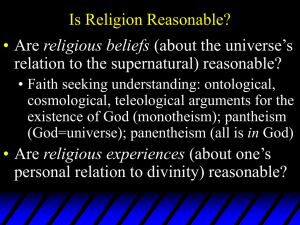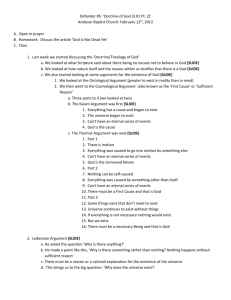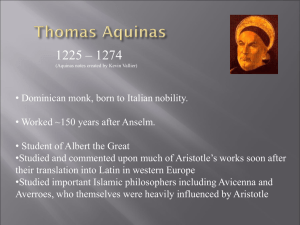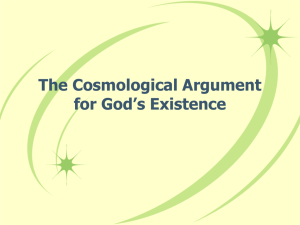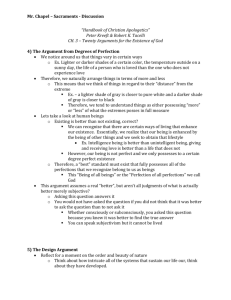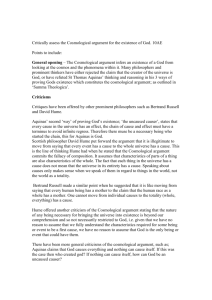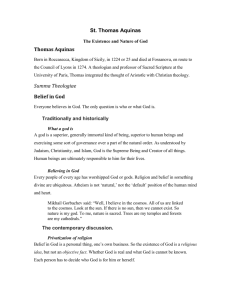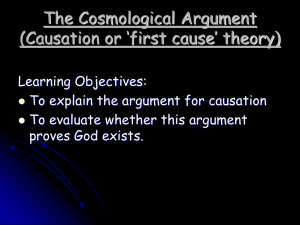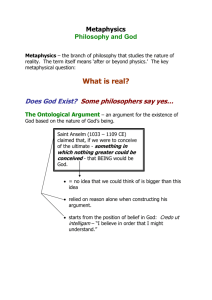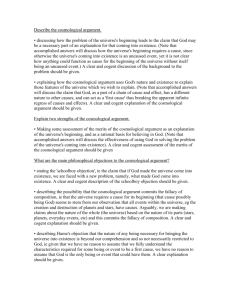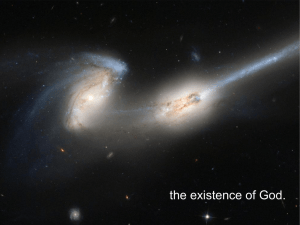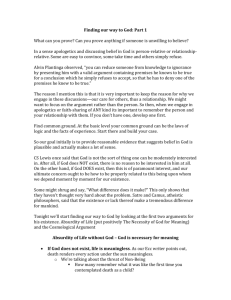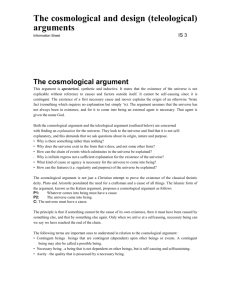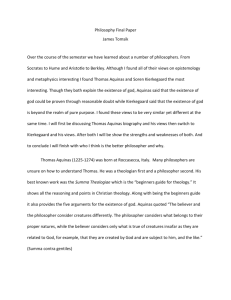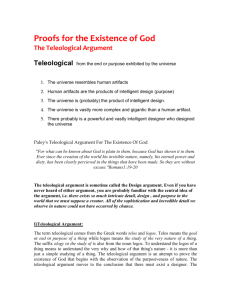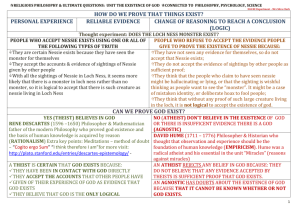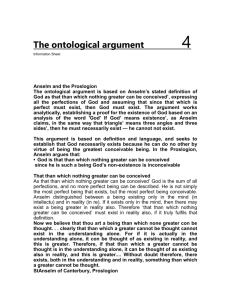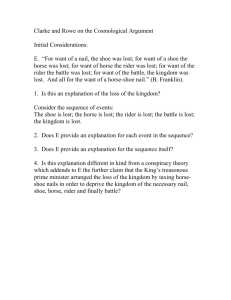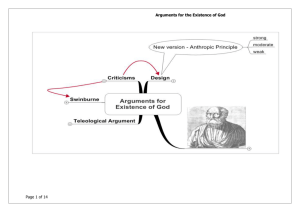Defining God: Reading Package (Metaphysics 5)
advertisement
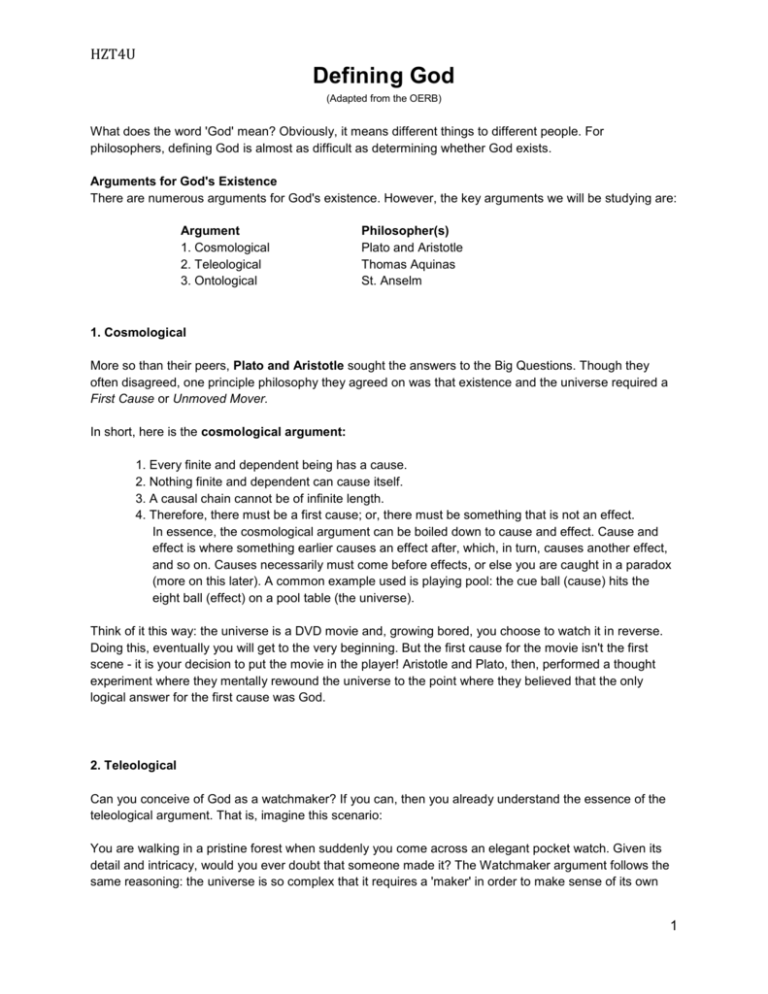
HZT4U Defining God (Adapted from the OERB) What does the word 'God' mean? Obviously, it means different things to different people. For philosophers, defining God is almost as difficult as determining whether God exists. Arguments for God's Existence There are numerous arguments for God's existence. However, the key arguments we will be studying are: Argument 1. Cosmological 2. Teleological 3. Ontological Philosopher(s) Plato and Aristotle Thomas Aquinas St. Anselm 1. Cosmological More so than their peers, Plato and Aristotle sought the answers to the Big Questions. Though they often disagreed, one principle philosophy they agreed on was that existence and the universe required a First Cause or Unmoved Mover. In short, here is the cosmological argument: 1. Every finite and dependent being has a cause. 2. Nothing finite and dependent can cause itself. 3. A causal chain cannot be of infinite length. 4. Therefore, there must be a first cause; or, there must be something that is not an effect. In essence, the cosmological argument can be boiled down to cause and effect. Cause and effect is where something earlier causes an effect after, which, in turn, causes another effect, and so on. Causes necessarily must come before effects, or else you are caught in a paradox (more on this later). A common example used is playing pool: the cue ball (cause) hits the eight ball (effect) on a pool table (the universe). Think of it this way: the universe is a DVD movie and, growing bored, you choose to watch it in reverse. Doing this, eventually you will get to the very beginning. But the first cause for the movie isn't the first scene - it is your decision to put the movie in the player! Aristotle and Plato, then, performed a thought experiment where they mentally rewound the universe to the point where they believed that the only logical answer for the first cause was God. 2. Teleological Can you conceive of God as a watchmaker? If you can, then you already understand the essence of the teleological argument. That is, imagine this scenario: You are walking in a pristine forest when suddenly you come across an elegant pocket watch. Given its detail and intricacy, would you ever doubt that someone made it? The Watchmaker argument follows the same reasoning: the universe is so complex that it requires a 'maker' in order to make sense of its own 1 HZT4U existence. In other words, there is no way that the universe could have been created by chance and not design. Thomas Aquinas explained the idea in his Summa Theologica: "The fifth way is taken from the governance of the world. We see that things which lack knowledge, such as natural bodies, act for an end, and this is evident from their acting always, or nearly always, in the same way, so as to obtain the best result. Hence it is plain that they achieve their end, not fortuitously, but designedly. Now whatever lacks knowledge cannot move towards an end, unless it be directed by some being endowed with knowledge and intelligence; as the arrow is directed by the archer. Therefore, some intelligent being exists by whom all natural things are directed to their end; and this being we call God." (The Summa Theologica of St. Thomas Aquinas Second and Revised Edition, 1920) Scientific View The teleological argument also receives some scientific support. Systematically, scientists have found that the universe is more complex than they initially hypothesized. Whether this complexity comes from dark energy or singularities, the fact remains that no scientific theory yet has an explanation for how the universe came into existence. In fact, due to the way the universe formed, no matter how powerful our telescopes become, humans will never be able to peer into the universe's first moments. Indeed, even Einstein argued for God's existence. Likewise, you yourself are a part of the universe - star stuff. That is, the atoms in your body were created (could only be created) and released upon the supernova exposition of dying stars. In a very literal sense, these explosions seeded the universe with the atoms necessary for life to develop and planets to form. In other words, every part of your body originated in a star. 3. Ontological "Come on now little man, get away from your worldly occupations for a while, escape from your tumultuous thoughts. Lay aside your burdensome cares and put off your laborious exertions. Give yourself over to God for a little while, and rest for a while in Him. Enter into the cell of your mind, shut out everything except God and whatever helps you to seek Him once the door is shut. Speak now, my heart, and say to God, 'I seek your face; your face, Lord, I seek.'" St. Anselm (1033 1109) Another argument for God's existence is the ontological. This argument is favoured by rationalists because it requires no external experimentation or proof - only reasoning. Although it has changed, the original idea put forth by St. Anselm argues that God exists because you can imagine that God exists. Sound confusing? Okay, imagine what attributes God must have (don't worry about whether God exists or not, just give it the properties God would need.) So, grab a sheet of paper and make out a list of God's Top Five Qualities. Finished? It is a safe bet that perfection is probably near the top of your list. Well, St. Anselm argued that the very fact that you can imagine perfection proves God's existence. How? He used this rationalist argument: 2 HZT4U 1 It is a conceptual truth (or, so to speak, true by definition) that God is a being than which none greater can be imagined (i.e., the greatest possible being that can be imagined). 2 God exists as an idea in the mind. 3 A being that exists as an idea in the mind and in reality is, other things being equal, greater than a being that exists only as an idea in the mind. 4 Thus, if God exists only as an idea in the mind, then we can imagine something that is greater than God (i.e., a greatest possible being that does exist). 5 But we cannot imagine something that is greater than God (for it is a contradiction to suppose that we can imagine a being greater than the greatest possible being that can be imagined.) 6 Therefore, God exists. (Taken from the Internet Encyclopaedia of Philosophy) The ontological argument suggests four principal qualities that God must necessarily have in order to be God: ● ● ● ● All Powerful (Omnipotent) All Seeing/Knowing (Omniscient) All Good Existence 3
